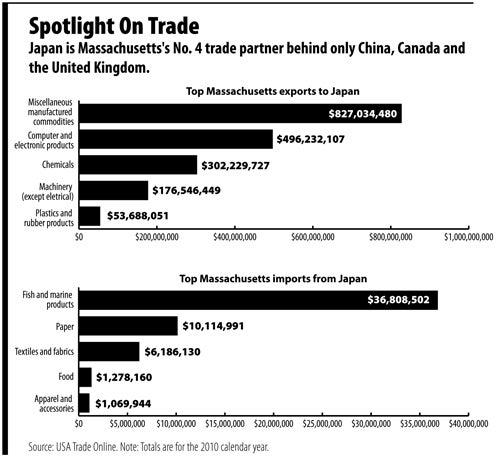The earthquake and tsunami in Japan this month has taken a massive toll on residents there. What is uncertain in the wake of the disaster is what the economic impact will be thousands of miles away in Central Massachusetts.
Despite the distance between the two, Massachusetts and Japan are closely linked through trade, with Japan ranking fourth among the state’s biggest export partners, falling behind only China, Canada and the United Kingdom.
While the United States as a whole buys more from Japan than it sells, the trade balance between Massachusetts and Japan is weighted toward Massachusetts, with the Bay State shipping more goods to Japan than they ship here.
Trade Partners
Japan imported more than $2 billion in commodities from Massachusetts last year, according to the U.S. Census Bureau’s Foreign Trade Division. That figure was up 17 percent from the year prior.
The commonwealth, in turn, imported $761 million in commodities from Japan during 2010.
That relationship will be impacted to some extent, said Kolleen Rask, a professor of economics at the College of the Holy Cross in Worcester.
Rask said that the damage is sure to disrupt some supply networks that exist between businesses in the United States and Japan.
“That’s the short-term concern,” Rask said. “Are people going to be able to get parts?”
How long those effects last will depend on how quickly Japan is able to rebuild and recover, she said, and some businesses may begin to seek alternate suppliers in other countries.
Bouncing Back
On the whole, Japan has been a valuable market for U.S. businesses, Rask said. “It’s a very high-tech market,” she said. “It’s a very well-organized market.”
Illustrating that point locally, companies operating here in Central Massachusetts have been investing in operations in Japan for the past several decades.
A handful of big companies here with operations in Japan reported that employees were safe and accounted for and that facilities in Japan did not sustain any major damage.
Most of the facilities run by those companies (or their parent companies) are located in and around Tokyo, which is more than 200 miles away from the epicenter of the earthquake.
But the companies were reticent to discuss what the impact of the disaster would have on their business. Most limited their comments to emailed statements expressing sympathy for Japan and stating that they were keeping close tabs on the situation there.
Among the companies who have business interests in Japan is Natick-based Boston Scientific, which announced in January that it had reached an agreement with a Japanese company to sell its cardiac rhythm management devices and accessories. BSX has had a presence in Japan since the late 1980s, according to its website, and has facilities across Japan, including an office in Sendai, where the tsunami hit.
But a spokesman would not comment on any damage there, only noting that all of the company’s employees in Japan were accounted for and that the company was conducting an assessment of any impact on operations.
Allegro Microsystems in Worcester is owned by a Japanese company, Sanken Electric Co. Ltd. Allegro said in a recent statement on its website that it does not have any manufacturing facilities in Japan, but that “a very limited number” of Allegro’s suppliers were based there, and that the company is in contact with those suppliers to gauge any impacts on facilities, inventory and logistics.
Sunovion Pharmaceuticals, a Marlborough-based company formerly called Sepracor, is also owned by a Japanese company.
The company was purchased in 2009 by Dainippon Sumitomo Pharma Co. Ltd., which is based in Osaka, hundreds of miles from the epicenter.
Sunovion spokeswoman Susan Adler said that the company sources schizophrenia drug Latuda from facilities in Japan, but does not expect any interruptions in supply of the drug, which was launched earlier this year. She said that DSP is still assessing damage to its facility in Kawagoe, north of Tokyo.
“Although we are relieved that the impact on Sunovion of the earthquake and tsunami in Japan has been minimal, our thoughts are with our Japanese colleagues, their families, and the people of Japan who have been affected by this terrible tragedy,” Adler wrote in an email.
Maine-based Idexx Laboratories Inc., a pet health care technology company that has a facility in North Grafton, also has a division operating in Japan.
Idexx Spokesman Tony Giampetruzzi said that there were some delays in shipping and transportation immediately after the quake, but said that the situation has since improved.
“Interruptions have been minimal and there has been very little impact to the business as a whole,” Giampetruzzi wrote in an email.

